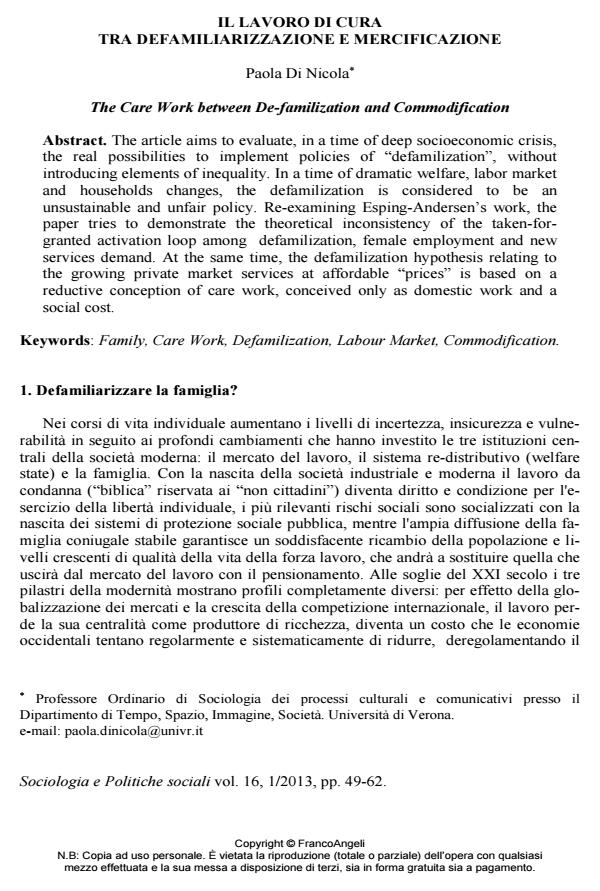Il lavoro di cura tra defamiliarizzazione e mercificazione
Journal title SOCIOLOGIA E POLITICHE SOCIALI
Author/s Paola Di Nicola
Publishing Year 2013 Issue 2013/1
Language Italian Pages 14 P. 49-62 File size 214 KB
DOI 10.3280/SP2013-001004
DOI is like a bar code for intellectual property: to have more infomation
click here
Below, you can see the article first page
If you want to buy this article in PDF format, you can do it, following the instructions to buy download credits

FrancoAngeli is member of Publishers International Linking Association, Inc (PILA), a not-for-profit association which run the CrossRef service enabling links to and from online scholarly content.
The article aims to evaluate, in a time of deep socioeconomic crisis, the real possibilities to implement policies of "defamilization", without introducing elements of inequality. In a time of dramatic welfare, labor market and households changes, the defamilization is considered to be an unsustainable and unfair policy. Re-examining Esping-Andersen’s work, the paper tries to demonstrate the theoretical inconsistency of the taken-forgranted activation loop among defamilization, female employment and new services demand. At the same time, the defamilization hypothesis relating to the growing private market services at affordable "prices" is based on a reductive conception of care work, conceived only as domestic work and a social cost.
Keywords: Family, Care Work, Defamilization, Labour Market, Commodification
- The Sociology of the Family in Italy: Its Contribution to Public Debate and Social Policies Donatella Bramanti, Maria Letizia Bosoni, Sara Nanetti, in The American Sociologist /2025 pp.171
DOI: 10.1007/s12108-024-09643-1 - Social innovation e welfare policies Giovanni Bertin, in SALUTE E SOCIETÀ 1/2015 pp.36
DOI: 10.3280/SES2015-001004EN - Condizione femminile, percorsi di vita e politiche sociali: nuove diseguaglianze nell'età anziana Isabella Crespi, Maria Letizia Zainer, in SOCIOLOGIA E POLITICHE SOCIALI 1/2015 pp.103
DOI: 10.3280/SP2015-001006 - Welfare state europei e capitale sociale. L'effetto della Crowding out Hypothesis in prospettiva comparata Michele Bertani, in SOCIOLOGIA E POLITICHE SOCIALI 3/2018 pp.139
DOI: 10.3280/SP2017-003008
Paola Di Nicola, Il lavoro di cura tra defamiliarizzazione e mercificazione in "SOCIOLOGIA E POLITICHE SOCIALI" 1/2013, pp 49-62, DOI: 10.3280/SP2013-001004